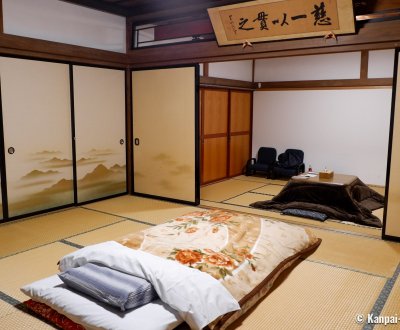Kakurinbo (Review)
Excellent Shukubo Inn Near Mount Fuji
Kakurinbo is a 2-stars Buddhist inn located in Minobu, a mountain village on the western side of Mount Fuji, in Japan’s Yamanashi prefecture. It offers an authentic experience of shukubo overnight stay at a temple, with an access by train from Tokyo.
Travelers looking for a different experience in a traditional Japanese accommodation should definitely try staying one night at a Buddhist temple (shukubo in Japanese). Mount Koya, in the Kansai area, is attracting most of foreign visitors for a shukubo overnight stay, however there are many other places throughout the archipelago, that are as authentic but preserved from mass tourism.
Nestled in Minobu, a small mountain village of Yamanashi prefecture, Kakurinbo belongs to the Gyogaku-in, a subtemple of Kuon-ji, the main spiritual center of the Nichiren Shu Buddhist sect. Managed by the Higuchi family, who also served as monks and nuns, for several generations, this guest-house welcomes visitors looking for a spiritual, traditional and quiet travel. Away from the bustling of the great cities, Kakurinbo is:
- Accessible from Tokyo in less than 3h by train 🚅;
- Located near Mount Fuji 🗻, on its western side.
The Buddhist inn, both charming and unique, is set in one of the most iconic natural sceneries of Japan.

Authentic and family-sized temple lodging
Kakurinbo is following the authentic codes of the shukubo temple lodging, that is to say:
- Visitors stay in a traditional Japanese room with tatami flooring, futon bedding, a tokonoma alcove decorated according to the seasons and fusuma or shoji removable partition screens to close the spaces. Furniture and equipment are simple and convenient: a coffee table and its low-rise chairs, air purificator, TV set, tea set and kotatsu heating blanket in winter. Some rooms have a beautiful view on the temple’s inner garden.
- Bathrooms and toilets 🚽 are shared between all the guests, and the sento baths of the inn can be privatized; in turn, guests write their name at the entrance to get 30 minutes of privacy in the hot bath, alone, or in couple and family. Koshu wine (a local specialty) is diluted in the water to give it its red color, and for its skincare properties.
- Meals are served in the kaiseki fashion, and are suitable for vegetarians as monks usually eat shojin ryori cuisine. Like any Japanese inn, delicious and original local specialties are served. Kakurinbo is renowned for its yuba (tofu skin) dishes, made with Akebono soybeans, a regional production unique to Japan.
- The morning prayer occurs at dawn every day between 5 and 6 a.m. and before breakfast. Make sure to wear clothes suitable for the season to take part in the spiritual session and start your day with peace of mind.
We particularly recommend this shukubo accommodation for the warm welcome the Higuchi family provides their guests, especially Ms Junko Higuchi who is the current head of the place. The guest-house concept is not overused and Kakurinbo offers to share briefly the daily life of a family of Buddhist monks.

Various and spiritual activities
In addition to accommodation and meals, Kakurinbo organizes several activities or shows to pursue meditation and to discover the various aspects of the local culture and arts.
We could try the following activities while we stayed at Kakurinbo:
- An interesting calligraphy workshop, on paper or on wine bottle label. We trained to write kanji characters with a brush and ink on a local washi paper, that can be kept as a souvenir afterward.
- The furisode long-sleeves kimono wearing experience, which is particularly fun for the ladies. The furisode is a wedding kimono styled 2 different ways during the fitting: the classic Japanese way, and a more Western-style way that let the shoulders show. A photo shooting is set to capture the moment for every participant. Men can also take part in this workshop with a formal kimono for men, without a Western-style styling.
- A demonstration of matoi (纏) handling is made by the owner’s son in a lively atmosphere, to the rhythm of uchiwadaiko drums and to the popular tune Sore ! Sore ! After having observed how to hoist the matoi, we tried to lift it as if in a matsuri.
- A gagaku (雅楽) show highlights the musical ambiance at dinner. 3 monks play traditional instruments (shô or mouth organ, hichiriki oboe, and ryuteki flute) in an unusual harmony that is also very soothing. Gagaku refers to ancient music and dance performed at the Imperial Court since Antiquity, and has been enlisted as a UNESCO Intangible Cultural Heritage since 2009.
Other activities such as guided tours, the making of Buddhist rosaries, indigo dyeing with designer Fumiko Sato, or the chanting of sutra are also available; they are described on the inn’s website (here) and can be booked upon arrival.

An original gateway, Kakurinbo is at the same time traditional, spiritual and rural at the foot of Mount Fuji. From the inn, it is easy to go visit Mount Minobu, Kuon-ji temple as well as the mausoleum of Nichiren Shonin (an influential monk of the 13th century), and the place can be used as a base to discover the cities of Kofu in the north, Fujinomiya and Fuji in the south.

